- Home
- Lucius Shepard
AZTECHS
AZTECHS Read online
Aztechs
Copyright © 2003 by Lucius Shepard
All rights reserved.
Dust jacket illustration
Copyright © 2003 by J.K. Potter
All rights reserved.
Interior design
Copyright © 2003 by Tim Holt.
All rights reserved.
FIRST EDITION
ISBN
1-931081-50-6
Subterranean Press
P.O. Box 190106
Burton, MI 48519
email:
[email protected]
website:
www.subterraneanpress.com
CONTENTS
PART ONE
PART TWO
Week Two
Week Three
PART ONE
Papa’s always saying there’s too many people in the world, but what’s he know…Old fool! Sitting home alone all day with his mezcal and his reefer. Drifting, dozing, dreaming. He never sees anyone, don’t talk to no one except me. Nobody real that is. He talks to Mama’s ghost, to the way she was back when she was fine and twenty-nine. I got the house fixed up nice, but he never lets me touch his room. Walls covered with brown butcher paper to hide holes in the plaster, and a photograph of him and Mama tacked up to cover a tear in the paper—looks like a stamp on a package, like this parcel he was carrying exploded in around him, got inverted somehow so the postage wound up on the inside, and he just sits there in the middle of it, getting mailed off to nowhere.
I was in the bathroom the other night, checking out the hair, the jacket, when he yells, “Eddie!” I cracked the door, peered down the hall and saw him at his table, goofing on the photograph. He’s a youthful forty in the picture, hair gathered into a ponytail under a funky straw hat, wearing a T-shirt with the word REVOLUTION printed on it and beneath that the slogan, You Are What You Rebel Against. He’s got an arm around Mama, who’s shading her eyes against the sun, and there I am too, because you see it’s a breezy day, and the summer dress she’s got on is molded to the ripening curve of her belly, evidence that Eddie Poe is on his way to the world. They’re on the San Diego side, about to cross over and lead a demonstration against Sony Corporation for exploiting the Mexican worker, but it looks as if they’re heading off to fuck on the beach at Hermosillo.
“Eddie…Goddammit!”
“Hang on a minute!” I said. “Okay?”
I figured out years ago why Papa loves that picture. It shows the last time they were happy. That night they were visited by some government types who played them a video featuring some of Papa’s less notorious co-conspirators getting their throats cut.
“Want to be with the beaners?” one guy asked Papa. “You got our permission. Go be with ’em. But you come back to the States, we’ll kill your ass. Try any legal bullshit, we’ll kill you for that. It’ll make a stink for a while, a loudmouth like you talking through his neck. All your movie star pals, they’ll be outraged. But it’ll blow over. Know why? In the grand scheme of things, your cause is shit!”
Papa called everyone he could think of who might help, but nobody could guarantee our safety, and when more of his friends turned up dead, he realized no amount of publicity could immunize us against the retribution of the various corporate entities who were determined to stabilize the profit environment they had established on the border. Mama died during a flu epidemic a couple of years afterward, and Papa’s health was broken by nearly two decades of working in the Sony maquiladora. I liked to think if I’d been in his position, with a young wife and a baby on the way, I’d have bailed on my principles to keep them safe—but it was a hard sell.
“Where you going tonight, Eddie?” he said as I swung on into his room. Before I could answer, he came back with, “Out to crawl in the sewer with the rest of the insects, I suppose.” He juiced his voice with an extra hit of disdain. “Watching you waste your life makes me sick at heart. The way you’re going, son, you’ve got no future.”
I was twenty-four years old and ran my own security service. Considering I’d grown up a gringo puro in one of the toughest barrios in Mexico, an illegal alien, a wetback in reverse, I’d done all right for myself. But Papa didn’t see it that way—he held me to a standard he couldn’t meet himself.
“I got no future?” I said, stepping close. “Who the fuck’s fault you figure that is?”
He refused to acknowledge me, his grizzled face like a clenched fist, eyes locked on the photograph of him and Mama.
“I wish I had the fuckin’ time to sit around and cultivate my mind,” I said. “Who knows what I might achieve? I might get to be a college professor with his head so far up his ass, he got nothin’ better to do than poke his nose places it ain’t wanted.”
“You never…” he began, but I talked right through him.
“And if I developed a really big brain, I might be able to screw things up so bad, I’d wind up livin’ in shit the rest of my life.”
“Just because you’ve become inured to the way things are,” he said, “that doesn’t mean I was wrong to want to change them.”
“Right…I forgot. You the revolutionary. A real leftist hero. Well, I don’t see you fuckin’ mannin’ the barricades now. All you do is sit and stare at that stupid picture! Here!” I dug into my jacket pocket, fingered out a plastic packet containing a dozen blue gelatin caps, and tossed them onto the table. “Wanna trip on your picture? These’ll put you right in there.”
He glanced at the pills but didn’t touch them.
“Go on…take ’em! I got ’em special for you.” I was so messed up behind the argument, my emotions were confused, and though I was enraged, I felt like crying and putting my arms around him.
He prodded the packet with a forefinger. I knew he was dying to take them, and this too was a cause of emotional confusion—I intended the pills to make him happy, but I also took pleasure in his weakness. He slit the seam of the packet, let the capsules dribble out onto the table, then said in a subdued tone, “What’re you doing tonight, son?”
“I’m gonna meet Guadalupe at Cruzados. We got business.”
He made a scornful noise.
“What’s wrong with you, man?” I said. “Lupe’s more honey than god. She’s my pale Spanish girl.”
He held a gelatin capsule up to the light—a gem dealer checking the water of a sapphire. “The woman’s playing you,” he said.
“Everyone plays everyone else. It’s the Master’s plan.”
“Yes, but she’s much better at it than you.”
I started getting angry again. “I gotta go,” I told him.
“How many of these do I take?” He had a handful of the pills.
“How fucked up you wanna get?”
His eyes cut toward the photograph. “Extremely,” he said.
Papa and I lived in what once was known as Mexicali, but had become an almost indistinguishable part of a single city that stretched from the Gulf to the Pacific, cozied up like a snake against the 1200-mile-long laser fence designed to wall off America from the poor, the tired, the hungry, the oppressed masses yearning for freedom. The fence—like the city it damned—had come to be called El Rayo, and living next to that enormous bug zapper, that fiery curtain hung between 100-foot-high titanium poles…well, they used to say living under power lines caused cancer, but living next to El Rayo caused cancer of the mind, the soul. It’s not what it was intended to be that made it so devastating, though a sheet of fire that could charbroil your ass however fast you passed through it was certainly the latest thing in barriers, the ultimate statement of contempt and disinterest. No, it’s like Papa once said, something that big is more magical than actual, more destructive as a symbol than as an isolationist tactic. When they switched it on, midnights along the b
order became red forever after, and everything that happened from that day forth took on that bloody color. Every action, every emotion, every dream.
First thing I noticed as I stepped out the door was El Rayo, like a blood-red wave about to break over us, standing seventy feet above the rooftops, its glare staining the starless reach of the sky, making that zoned-out humming sound. Then the rest of the street snapped into focus, a single-file herd of lowriders humping and fucking the pavement, giant metal roaches tattooed with hellfire, images of the Virgin, slogans. Demented bearded faces inside, arms and legs poking out the windows. Those things never go out of style, that grinding racha chacha chacha sound they make, speakers blasting out salsa, border reggae, warped conjuntos, Malaysian pop, music from a million places jammed together into one big scratchy, bumping, throbbing noise that put grooves on the inside of your skull. They rocked along in a jangle of light past appliance shops with Aztec temples painted on their facades, bodegas, clubs, souvenir shops, their bright windows aglitter with crystal crosses gilt madonnas rhinestone eagle knives flashing in miles of red midnight, little stucco caves with corrugated iron doors rolled partway down, interiors littered with every form of cheapness: mirrors with ornate tin frames, torrero capes with airbrushed scenes from the Plaza del Toros, sombreros festooned with embroidery and bits of broken mirror, switchblades with dragons worked in gold paint you could scrape off with your thumbnail. Watching from the curb were whores stuffed into dresses that looked like napkin holders cinched around globs of brown fat, their faces like images painted on a sideshow facade, rouge-dappled cheeks and starred eyes and oohing crimson mouths opening onto funhouse rides. Cruel, dark male faces stared from the doorways and alley mouths. Carved eyebrows and lava flows of black hair, eyes black magnets and gold-glinting teeth, mustaches sharply drawn as scythes, neon-lit coils of cigarette smoke slithering from their lips. Vendors pushing fruit drinks, bocadillos, ices, shish kebabs of dead dog slathered with red sauce, knock-offs of high-tech toys…I used to have this dream about El Rayo, I’d come swooping down in a plane, cutting so low my wingtip would brush the fire, then I’d climb way high so I could see the entire length of it and wonder if the men who built it recognized the sinister shape they had called into being. What immense signal were they flashing out into nowhere? What character did it form? What meanings did it have in how many alphabets? With what secret societies and cosmic institutions did it align? Seeing it that way. I understood that nothing in this world existed for the reasons stated by Einstein, and that nothing Einstein ever said made any sense except on the level of pure magic, because at the bottom of all that mathematical boogaloo is just jungle noise and street rhythms and a vast primitive design.
Cruzados constituted something of an irony as related to El Rayo in that you could enter the club from either side of the border. The laser fence cut through the center of the place, obscured behind roll-down metal doors. The management had rigged subterranean charges that would jolt the transmitters every hour on the hour, causing a three-second interval in the beam, and during that interval you could jump across from Mexico to the States or vice versa. It may seem strange that this was permitted, but illegal crossings on a small scale weren’t considered a problem—both sides of the border, after all, shared the same economy, the same terrible pollution and crime rate, and La Migra kept watch on the American side to make certain that no one truly dangerous, like Papa, slipped into the Land of the Free.
I loved the darkness of the club, the little orange candleflames in glass cups on all the tables, the iron door that hourly would slide up to reveal El Rayo, the lion heartbeat rhythm of the background music, the curving black and chrome bar. It was my office, my soul’s true home. I grabbed a seat at the bar, and the bartender seemed to glide on a track toward me, his silver teeth cutting a crescent smile, eyes gleaming black bugs, sideburns pointy black stilettos…
“Can I bring you something, Mister Poe?”
“Orlando! Buenas noches,” I said. “Tequila and a beer back.”
The television above the bar was playing El Rayo’s Greatest Hits. Showing how people tried to cross in the early years after the barrier was switched on, at the moment focusing on one guy who had covered his car with cheap mirrors, because he’d heard mirrors reflect lasers, but had not known the mirrors needed to be perfect, and drove straight into the barrier, emerging on the other side as a smoking wad of melted glass and steel. The tape contained dozens of such idiot plays. There was another tape of people making pilgrimages to the barrier, building altars and shrines beside it, and sometimes throwing themselves into the fire; but that one wasn’t as popular, because people still did that shit.
Orlando brought my tequila and beer, and I asked him what was up. He relaxed somewhat from his pose of evil suavity and said, “You know that chingado Tonio Fernandez? Got that TV show in San Diego talks about border issues…all that shit? Yeah, well he hears how Guty Cardenas…Remember him? Junior welter champ ’bout eight, nine years ago? Okay. So Tonio hears how he’s all fucked up on drugs. Guty dopes at my uncle’s place in TJ. I see him there all the time. And Tonio decides he’s gon’ come down and lay this Mexican Jesus soul trip on him…get him clean, right.” Orlando paused to light a cigarette and blew a silvery glowing ring. “This is funny, because Tonio’s ’bout as Mexican as a goddamn bag of Cheetos. The guy talks like a fuckin’ Baptist. Guty couldn’t get away from his ass fast enough. I mean, even dope hell’s better’n that shit, you know. He does not want to be saved. Does not want to be resurrected or rocked out of his depression. He wants to go down the hole with a grin on his fuckin’ face. He refuses to be turned into a splendid clean splinter of what he once was and paraded out as a rehab wonder. Like, see what can be made of these raw materials with the proper Christian conditioning…”
My message center buzzed. I told Orlando I’d catch the rest of his story later and touched a button on the counter. A screen and a keypad popped up from the bar; I punched in a code. Seconds later, a muscular guy in a wifebeater undershirt was staring back at me from the screen. His trapeziuses bulked up from his shoulders like foothills flanking the mountain of his head. His face, shadowed by a few days’ growth of beard, was the hard, contemptuous face of somebody who liked to hurt people. I’d never seen him before, didn’t know his name, but I could tell he was Sammy by the unblinking eyes and reflexive clump of his jaw muscles, by his precision of speech and utter lack of inflection and the sergeant’s stripes tattooed on his cheek. Since the beginning of the Pan-Mayan War, vets addicted to the samurai drug had been settling this side of the border where no one would try to outlaw their violent subculture. They had proved a significant asset to the economy; their no-holds-barred pit fights were a major tourist attraction and they provided a terrific source of expert muscle for people like me. The ex-sergeant had a flesh-colored adhesive patch affixed to his neck that released a steady supply of his favorite poison into his system. That struck me as odd. Most of his kind preferred an implant—implants were harder to rip off during a fight.
“Eddie Poe?” the ex-sergeant said.
I switched his voice to my earphone and said, “Talk fast.”
All the muscles of his face appeared to ripple—he didn’t like my tone, I guess. “Larry Crespo is dead,” he said after regaining control.
That was bad news, but I didn’t trust the source. “How’d you get this number?”
“From Crespo. He thought you might be able to use me.”
“What a coincidence. Here I am short one Crespo, and you just happen to call.”
Considering my disrespect, I figured he would have loved to tear me apart; but his control was excellent. People not of the tribe pissed Sammy off under the best of circumstances.
The buzzcut guy spoke through his teeth. “If you’re insinuating I killed him…Crespo was part of my seven.”
I wasn’t that familiar with Sammy culture, but I knew that “my seven” referred to a blood bond. By telling me this, he was declaring
his innocence in a persuasive fashion. But I was still suspicious—I didn’t like accidents, especially on an important job.
“What’s your name, Sarge?” I asked.
“Lawton Childers.”
“Got a resume?”
“You should already have it.”
“Oh, yeah.” I tapped a key and the resume appeared on-screen. “I see you worked for the Carbonells recently. Got any problem with killin’ a few of ’em?”
“Be my pleasure,” said Childers without expression.
“Probably won’t be necessary.” I studied the remainder of the resume. “I need quality work tonight. Restraint is key. You’ll be protectin’ a representative of AZTECHS during a negotiation with the Carbonells.”
“Understood,” Childers said.
“What’s your impression of the Carbonells?”
Childers’ smile developed slowly—an emblem of ferocity. “They’re not half as bad as they think they are.”
“That’s not what I’m askin’,” I told him. “You have any insights into their personalities might be helpful?”
“I paid no attention to their personalities.” Childers said.
I continued reading the resume. “Three tours in Guatemala. Damn, you musta loved your country!” I gave him a sardonic wink.
Childers stood mute.
“You haven’t done much bodyguard work,” I said. “Why now?”
“I’m going to need the operation.”
In Sammy parlance, “the operation” was a bioengineering procedure to overcome a decline in sensitivity to the drug.
“How’s your tolerance now?” I asked.
“I killed an ape in a pit fight last weekend. You can verify it.”
“Somebody’s pet monkey? King Kong? What?”
“Orangutan.”
I didn’t like switching horses in midstream, but since my horse was dead, I had little choice, and if the drugs had boosted Childers’ combat abilities to the point where he had taken out an orangutan in hand-to-hand, he might be a better bargain than Crespo. “All right,” I said. “The recording of this transmission will be our contract. I’m hirin’ you for the duration of the job. Standard terms. Bonus to be determined.”

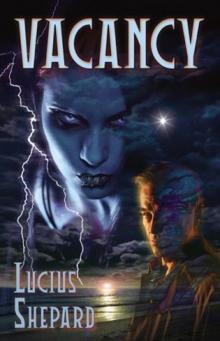 Vacancy & Ariel
Vacancy & Ariel The Dragon Griaule
The Dragon Griaule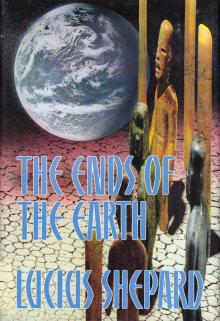 The Ends of the Earth
The Ends of the Earth Two Trains Running
Two Trains Running Life of Buddha
Life of Buddha Louisiana Breakdown
Louisiana Breakdown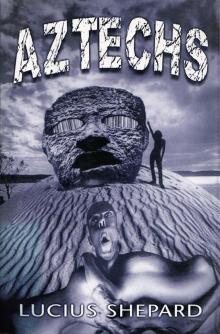 AZTECHS
AZTECHS Life During Wartime
Life During Wartime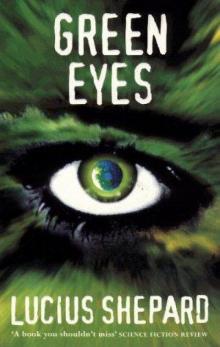 Green Eyes
Green Eyes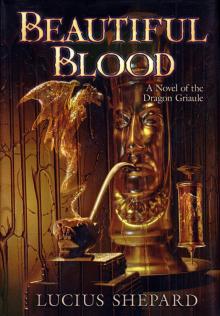 Beautiful Blood
Beautiful Blood Stars Seen Through Stone
Stars Seen Through Stone Viator
Viator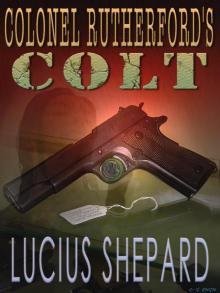 Colonel Rutherford's Colt
Colonel Rutherford's Colt Dagger Key and Other Stories
Dagger Key and Other Stories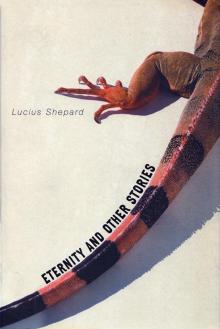 Eternity and Other Stories
Eternity and Other Stories Softspoken
Softspoken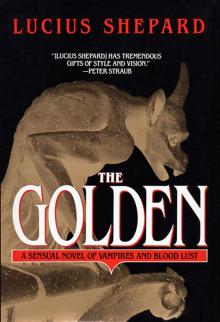 The Golden
The Golden